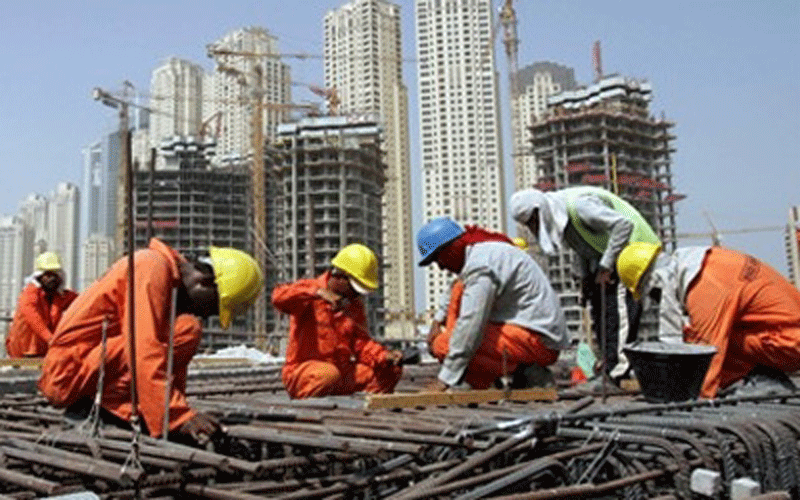Work and Live in Middle East
Overview
Specialized in recruiting Skilled and Professional workforce, Temporary Worker, Labour Jobs, Skilled Trade Jobs and Business Visa
Our Clients






Skilled Worker
Skilled Worker who has special skills like Designing, Drafting, Merchandising, Accounting, Etc
We have Employers who are looking for Skilled Work force with handsome Salary
- Salary as per market Standards
- Food and Accommodation
- Annual leave and vacation with travel expenses

Professionals
We have a special opening for Nurse, Doctors, Engineers, Architectures, etc
Very Good Salary and conveys to earn in Middle East cities like Dubai, Jeddah, Doha, Muscat, Etc
- Salary As per Market Standards
- Food and Accommodation and Family Visa
- Annual Leave and vacation with travel expenses

Labour Jobs
10th and 12th pass Candidate can apply for Helper, Store Keeper, Cashier jobs
decent salary at labours jobs also available
- Salary as per market standards
- Food and Accommodations
- Annual Leave and Vacation
Jobs in Saudi Arabia
Saudi Arabia, a very important destination for several Indian job seekers. From time immemorial these two countries have had relations and the bonds only seem to be growing. Both countries share a warm and cordial relationship which is only getting better by the day. Business between the two seems to be toning up and with India as a source of manpower talent, there is scope for great growth in the job one picks up. For so many job seekers, it is the mecca of all desires and dreams. Apart from being a beautiful country, it is also a country where job seekers live without fear or fright as everything is so clean and clear in terms of rules and regulations. For a law- abiding job seeker, Saudi Arabia is a real haven.
With an economy focused on Oil and gas industry more than 70% of the government revenue and more than 90% of exports of the country is based on oil and gas. One of the most unique prospective of Saudi Arab is that more than 80% of its working population is based on foreign workers. Desert Agriculture is another highly prominent sector with government subsidies and advanced technologies.
ARGC had dutifully served its clientele in Saudi Arabia for so many years now. Be it Jeddah, Riyadh or other places, India are well paced in all these cities and having been serving their corporations well. Because of the quality of personnel, we have generated from time to time, we become an automatic favorite for recruitment. The staff we have sent to various companies, have come back to us thanking us often for having given such good breaks to them. But Saudi Arabia being a fantastic job market, makes the job easy for us. Our only request to our candidates is to come well prepared and be ready to seize the opportunity in this fantastic job market and not miss this golden opportunity! From our end we will ensure we will do our best to put you on the flight to Saudi Arabia. ARGC Manpower is familiar
with the growing demands of professionals in Saudi Arabia and is aptly supplying human resources that are required by the agencies and corporations in Saudi Arabia.
Saudi Arabia’s industry sectors are dominated by petrochemicals and petrochemical-based products. The main industries in Saudi Arabia include crude oil production, petroleum refining, ammonia, industrial gases, sodium hydroxide, fertilizers, cement, plastics, metals, construction, commercial ship and aircraft repair.
Saudi Arabia’s main industry is Oil and Gas. It possesses 18% of the world’s proven Petroleum reserves earning it second largest oil reserve in the world.
Saudi Arabia is ranked as the largest exporter of petroleum and played a leading role in OPEC for many years
Saudi’s private sector is dominated by construction and real estate. The industries are heavily dependent on government spending which is dependent on oil revenues.
Saudi has made significant attempts to diversify away from core oil and gas by developing a sophisticated manufacturing and logistics infrastructure. It now boasts itself as the largest manufacturing hub within the Middle East, which looks set for further investment as part of the Saudi 2020 vision.
Jobs in UAE
Saudi Arabia, a very important destination for several Indian job seekers. From time immemorial these two countries have had relations and the bonds only seem to be growing. Both countries share a warm and cordial relationship which is only getting better by the day. Business between the two seems to be toning up and with India as a source of manpower talent, there is scope for great growth in the job one picks up. For so many job seekers, it is the mecca of all desires and dreams. Apart from being a beautiful country, it is also a country where job seekers live without fear or fright as everything is so clean and clear in terms of rules and regulations. For a law- abiding job seeker, Saudi Arabia is a real haven.
With an economy focused on Oil and gas industry more than 70% of the government revenue and more than 90% of exports of the country is based on oil and gas. One of the most unique prospective of Saudi Arab is that more than 80% of its working population is based on foreign workers. Desert Agriculture is another highly prominent sector with government subsidies and advanced technologies.
ARGC had dutifully served its clientele in Saudi Arabia for so many years now. Be it Jeddah, Riyadh or other places, India are well paced in all these cities and having been serving their corporations well. Because of the quality of personnel, we have generated from time to time, we become an automatic favorite for recruitment. The staff we have sent to various companies, have come back to us thanking us often for having given such good breaks to them. But Saudi Arabia being a fantastic job market, makes the job easy for us. Our only request to our candidates is to come well prepared and be ready to seize the opportunity in this fantastic job market and not miss this golden opportunity! From our end we will ensure we will do our best to put you on the flight to Saudi Arabia. ARGC Manpower is familiar
with the growing demands of professionals in Saudi Arabia and is aptly supplying human resources that are required by the agencies and corporations in Saudi Arabia.
Saudi Arabia’s industry sectors are dominated by petrochemicals and petrochemical-based products. The main industries in Saudi Arabia include crude oil production, petroleum refining, ammonia, industrial gases, sodium hydroxide, fertilizers, cement, plastics, metals, construction, commercial ship and aircraft repair.
Saudi Arabia’s main industry is Oil and Gas. It possesses 18% of the world’s proven Petroleum reserves earning it second largest oil reserve in the world.
Saudi Arabia is ranked as the largest exporter of petroleum and played a leading role in OPEC for many years
Saudi’s private sector is dominated by construction and real estate. The industries are heavily dependent on government spending which is dependent on oil revenues.
Saudi has made significant attempts to diversify away from core oil and gas by developing a sophisticated manufacturing and logistics infrastructure. It now boasts itself as the largest manufacturing hub within the Middle East, which looks set for further investment as part of the Saudi 2020 vision.
Jobs in Kuwait
Kuwait, anArab country on the Persian (Arabian) Gulf, has cultural heritage dating back to antiquity. Kuwait City, the capital, is known for its modern architecture, ranging from skyscrapers to the striking Kuwait Towers, water towers whose design recalls the tileddomes of a classic mosque.
A country in Western Asia, Kuwait is located on the northern edge of Eastern Arabia at the tip of the Persian Gulf. It has a population of 4,348,395 and a total land area of 17,820 km. Petroleum is the main export product of Kuwait. The country’s petroleum-based economy has created job opportunities for skilled professionals. Kuwait is the fourth richest country in the world per capita, according to World Bank. It has one of the lowest unemployment rates in the world.There are many jobs in Kuwait with great opportunities in Oil, Gas, Petroleum, Construction & the manufacturing sector is also dominatedby oil products and is mainly export-oriented. ARGC Manpower is familiar with the growing demands of professionals in Kuwait and is aptly supplying human resources that are required by the agencies and corporations in Kuwait.
The petroleum industry in Kuwait is the largest industry in the country, accounting nearly half of the country’s GDP. Kuwait has crude oil reserves of 104 billion barrels (15 km³),estimated to be 9% of the world’s reserves.
The construction industry is highly developed and has seenan observant resurgence of activity in recent years.
Kuwait has one of the oldest and most financially stable economic systems in the Middle East, with a stock exchange which dates back over 50 years and a well-developed banking system.
57% of Kuwait’s GDP comes from non-oil industry (mostly business services, manufacturing, retail trade, financial institutions, construction, transport and real estate). Other major industries include real estate,shipping, construction, cement, water desalination, construction material and financial services
Jobs in Qatar
Qatar is a peninsular Arab country whose terrain comprises arid desert and a long Persian (Arab) Gulf shoreline of beaches and dunes. Also, on the coast is the capital, Doha, known for its futuristic skyscrapers and other ultramodern architecture inspired by ancient Islamic design, such as the limestone Museum of Islamic Art.
Qatar has oil reserves of 15 billion barrels and gas fields that account for over 13% of the global resource. However, oil production will not remain at peak levels of half a million barrels per day, as oil fields are predicted to be mostly depleted by 2023. Large natural gas reserves have been located off Qatar’s coast and further phases of North Field gas development costing billions of dollars are in various stages.
Construction is Qatar’s fastest-growing sector, with the government having pledged $200 billion of investment as part of a vast infrastructure expansion scheme. As a result, opportunities for contractors abound, particularly in the transport, retail, real estate, tourism, and education sectors, not to mention the eight multibillion-dollar stadia being built in preparation for the 2022 FIFA World Cup. With such rapid growth, however, the sector has faced numerous challenges, including late payments, inflation and project delays.
Real Estate and Property: Property prices in Qatar continue to rise rapidly. This is all supported by rapid economic and population growth, and a construction boom in preparation for the 2022 FIFA World Cup.The value of real estate transactions rose by 18% year on yearto QAR36 billion in the first half of 2015, and has almost tripled over the last five years.
A fast-expanding population and a steady supply of infrastructure projects and hydrocarbons have allowed Qatar’s banking sector to maintain a continuous double-digit growth. However, while the project pipeline remains full, the increasingly competitive banking environment has to lead the nation’s lenders to seek revenue in untapped segments of the market. This results innew products and services, and an increased investment in markets beyond Qatar’s borders.
Qatar is emerging as the most attractive market for retailers in the Middle East.The Gulf state was a new entry at fourth in the latest Global Retail Development Index (GRDI).Despite the record drop in oilprices, retail sales growth is expected to continue. Indeed, the retail space pipeline remains strong, with several major projects underway in Qatar.
Association football is the most popular sport in Qatar, both in terms of players and spectators. Qatar won their bid to host the 2022 FIFA World Cup, despite never previously qualifying for the FIFA World Cup Finals. This is creating huge revenue in the country much like the expectation of Dubai Expo 2020 in the UAE.
Jobs in Bahrain
Oil comprises 86% of Bahraini budget revenues, despite past efforts to diversify its economy and to build communication and transport facilities formultinational firms with business in the Gulf.As part of its diversification plans, Bahrain implemented a Free Trade Agreement (FTA) with the US in August 2006, the first FTA between the US and a Gulf state.
Other major economic activities include the production of aluminum –Bahrain’s second biggest export after oil –finance, and construction. Bahrain continues to seek new natural gas supplies as feed-stock to support its expanding petrochemical and aluminumindustries.The main industry is petroleum production, processing, and refining. Others industries are aluminum smelting, offshore banking, ship repairing, and tourism. The country also produces cement blocks, plastics, asphalt, paper products, and soft drinks.
The city of Bahrain is also a hub for banking and financial services, with it taking over in the 80s from Beirut as the center for the region. In the last decade, it has seemed to decline to other cities, such as Abu Dhabi and Dubai.
Jobs in Oman
Oman officially the Sultanate of Oman, is an Arab country on the southeastern coast of the Arabian PeninsulainWestern Asia.Holding a strategically important position at the mouth of thePersian Gulf, the country shares land borders with theUnited Arab Emiratesto the northwest,Saudi Arabiato the west, andYemento the southwest, and sharesmarine borderswithIranandPakistan. The coast is formed by theArabian Seaon the southeast and theGulf of Omanon the northeast. TheMadhaandMusandamexclaves are surrounded by the UAE on their land borders, with theStrait of Hormuz(which it shares with Iran) and Gulf of Oman forming Musandam’s coastal boundaries.
Oman industry sectors include crude oil production and refining, natural and liquefied natural gas (LNG) production; construction, cement, copper, steel, chemicals and optic fiber.Oman’s depleting oil wealth means the role of the manufacturing units and industries assumes greater importance in sustaining the country’s economy. Aware of the vulnerability of its dependency on a non-renewable natural resource, the Omani government has increased funding for sectors based on renewable natural resources that can provide sustainable economic growth.
Oman’s industrial sector, particularly the petrochemicals segment, is poised for large expansion with ongoing investment in downstream infrastructure and new facilities in the pipeline for the Sohar and Salalah industrial regions expected to contribute significantly to output before 2020. Added to this is the rapid development of Oman’s ports, rail as well asairports, which is expected to drive its reputation as a regional logistics hub while developing the tourism sector, which is considered as key moving forward.
